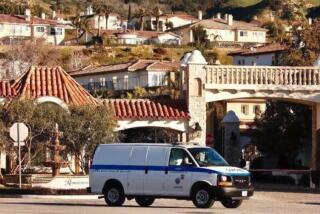Bias Case Enhanced Tribble’s Drug Career
- Share via
WASHINGTON — Acquitted three years ago on charges he supplied the cocaine that killed University of Maryland basketball star Len Bias, Brian Lee Tribble didn’t feel chastened. Or lucky. By all accounts, Tribble walked away feeling invincible.
He was a headliner at East Side, a now-defunct Southwest Washington club, where the taped telephone message said, “Every Tuesday, you’re invited to a dance party with Brian Tribble.”
Last July, he was mobbed at his 10-year high school reunion by classmates who wanted to be photographed with him.
“Nearly every time I turned around, he was having his picture taken again,” said Fred Hammond, a fellow member of McKinley High School’s class of 1980. “He left with a stack of Polaroids in his hand.”
Old classmates weren’t the only ones seeking Tribble’s time.
“After the Len Bias case, Tribble really came up in the drug world,” said Veronica Baker, a federal Drug Enforcement Administration agent.
“Drug dealers thought he was safe--he was a dealer who wouldn’t turn. He had people calling from all over the country to make deals.”
On Aug. 6, Tribble was arrested and subsequently pleaded guilty to conspiracy to distribute cocaine. Law enforcement agents call him a major Washington area drug supplier and attribute that career development, ironically, to the national publicity surrounding the death of Bias, the promising young All-America forward.
Tribble’s conviction puts this final twist on the Bias case, say those who knew him: The man who most likely could have been scared straight by the episode instead came away with his popularity and his credibility among drug suppliers wildly enhanced.
DEA agents are uncertain when Tribble began selling drugs, but his lawyer, Thomas C. Morrow, maintains it did not happen until after the Bias case.
“My impression was that, pre-Bias, he was not really much involved in drugs at all, except for recreational use,” Morrow said.
In any case, Tribble’s big break apparently came a year after the Bias verdict, when he went to Miami and made an important drug connection.
After that, he essentially was a wholesaler who sold cocaine in large quantities rather than packaging it for street sales, a federal law enforcement source said. It was an approach that lowered Tribble’s profits somewhat, but also reduced his risks.
“He would get three kilos for 20 grand apiece, and he had buyers for them for 25 grand apiece,” the source said.
But what really allowed Tribble to move into the top echelons of the drug trade, according to his lawyer and law enforcement officials, was the cachet his name acquired from the Bias case.
“People were willing to front him large quantities of cocaine and he could pay later,” the DEA’s Baker said. “The Len Bias thing . . . made drug dealers have more respect for him and in his own mind, he was maybe accused wrongfully and he had beat it.”
“After (the Bias incident) is when I started to hear more about Brian Tribble and his lifestyle,” said Hammond, who knew Tribble in high school but only peripherally afterward.
“People would say, ‘I saw Brian Tribble; he was driving a 450 SL or he was driving a Nissan 300ZX; he must be doing pretty well.’ ” Hammond said.
Many young people in Tribble’s old Northeast Washington neighborhood think Tribble was accused wrongly and speak of him, in the same breath with D.C. Mayor Marion Barry, as a kind of martyr to a white conspiracy.
“They figure, ‘We spent too much money on him once, we’ve got to get him somehow,’ ” said a man in the playground of Woodridge Elementary school, who said he knew Tribble well and did not want his name used. “This arrest was a setup.”
The man did not deny Tribble’s involvement in drugs, but said “he was not that big a dealer, he was out here struggling like the rest of us.”
Tribble is being held in a jail in Maryland, pending a January sentencing, DEA officials said. He faces a minimum of 10 years without parole under federal sentencing guidelines.
DEA officials said Tribble is being protected while they question him about other drug cases.
Intelligent, popular, fashion-model handsome, the first child to go to college from a good family in a modest neighborhood of well-kept houses in Northeast Washington, Tribble seemed to have a lot going for him.
“His life should not have been so disheveled and disruptive as it was,” said James McMullen, a physics teacher at McKinley High School, which Tribble attended from 1976 to 1980.
Tribble’s mother, Loretta, helped lend her son much of whatever credibility he had during the Bias trial.
She told any reporter who would listen that then-Prince George’s County State’s Attorney Arthur A. “Bud” Marshall Jr. was exploiting the incident for political gain. She spoke of setting up a “Brian Tribble Defense Fund.” She steadfastly declared that her son was a victim.
Now, she says “she doesn’t consider him a victim of anything but his own stupidity,” Morrow said. Reached at home last week, she said, “I don’t want any part” of another story on her son.
That Loretta Tribble and her husband, Thomas, are now silent comes as no surprise to those who were close to the family during the trial. The couple view the 1986 incident, Morrow said, “as Brian being given a new lease on life and being born again.”
“The worst thing they could possibly imagine is this deja vu situation,” he said. “When she heard, she was shocked, just devastated.”
It was natural that on the night of June 18, 1986, after Len Bias learned of his selection by the Boston Celtics in the first round of the National Basketball Association draft, he would celebrate with Brian Tribble. Although Tribble had dropped out of the University of Maryland, he still hung around the College Park campus. Tribble and Bias had developed an easy friendship, friends said, sharing interests in basketball, music and the club scene.
And it was Tribble, according to police, who called them panic-stricken when Bias began going into convulsions from the cocaine in the early hours of June 19.
As the case evolved, it took on larger proportions, calling into question Bias’s character, the conduct of the State’s Attorney’s Office and the integrity of the university’s athletic department. But the focus of the furor remained Tribble, cast alternately as a Mephistopheles who enticed Bias and his teammates into drug abuse or an innocent bystander in a tragic accident involving a famous man.
Tribble admitted in a television interview after the trial to “recreational-type usage” of cocaine and to taking drugs with Bias on the morning he died, but he and defense attorneys were adamant in their denial that he had supplied the cocaine that killed Bias.
The FBI kept tabs on Tribble after the verdict and began building a case against him, law enforcement sources said.
The final stroke came last summer, sources said, after DEA agents arrested a Bahamian citizen who had arrived at Dulles International Airport on a flight from Miami with four kilograms of cocaine--drugs he was delivering, he said, to Tribble.
A sting operation was set up in a hotel parking lot in New Carrollton in which a Tribble supplier, cooperating with federal agents, arranged by telephone to sell him 8.8 pounds of cocaine for about $100,000. When agents moved in for the arrest, Tribble fled, first by car, then on foot. He turned himself in Aug. 6.
In pleading guilty last month, Tribble acknowledged that he and a loose group of associates sold more than 110 pounds of cocaine over an 18-month period, making hundreds of thousands of dollars. At one point, he was selling as much as 22 pounds a month, according to prosecutors, who called him a central figure in a major Washington area drug ring.
Most people who recall Tribble as a youth say he was smart. A woman who baby-sat with him, Flora Hill, described him as “very polite.” At the time of his arrest, shocked teachers at the schools he attended said he was articulate and a good, though not exceptional, student. “He was,” said May Wright Covington, a former typing teacher, “the kind of son you would want.”
Tribble’s father, a drummer who traveled on the jazz circuit under the name “TNT,” later operated a small furniture repair business. His mother was a teacher and took care of his sister, Priscilla, who is mentally retarded and prone to seizures. Tribble has another sister, Gloria, and a brother, Tom Jr., who was convicted in 1988 on drug and weapon charges.
Tribble worked during college as a warehouse laborer, mail handler and clerk at Howard University Hospital, and played basketball when he cold. Although he loved the game, participated in Boys Club tournaments and played on the high school’s junior varsity team. Tribble was known more for his enthusiasm than for his promise.
“He was more interested in the cheerleaders than the team,” classmate Deitra Payne said.
Why didn’t someone like Tribble, with his personality, wits and family, make it?
“I wish I knew the answer to that,” McMullen said. “How does this happen to a kid so early? For a physics teacher, it’s a strange thing to say, but all I can think of is, the seed went bad; the devil got him.”
More to Read
Sign up for Essential California
The most important California stories and recommendations in your inbox every morning.
You may occasionally receive promotional content from the Los Angeles Times.













